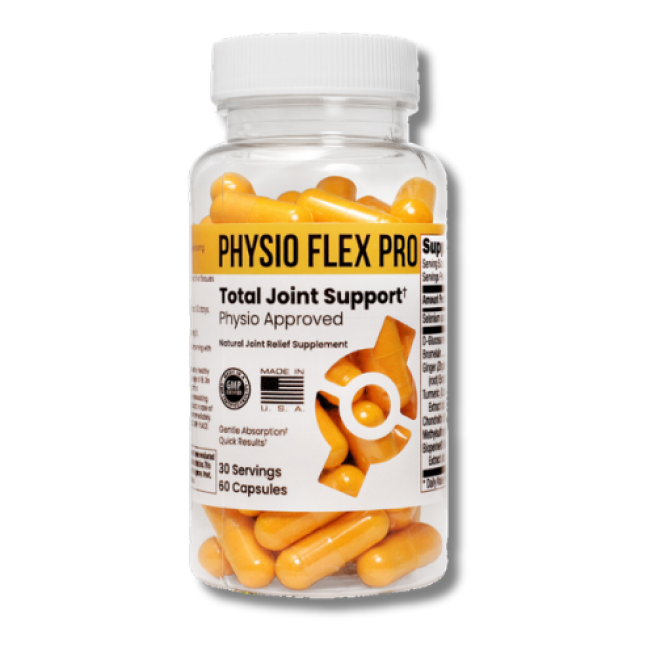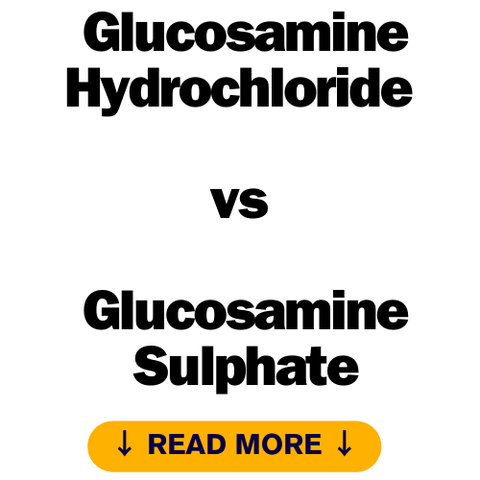Deciding between glucosamine hydrochloride and glucosamine sulphate for joint health can be complex. This article simplifies that choice. We offer a clear comparison of these glucosamine forms, catering to everyone from fitness enthusiasts to those mindful of aging joints.
Drawing on expert insights, we provide not just facts, but practical advice. By the end of this guide, you'll have a solid understanding of both glucosamine types, helping you confidently choose the right one for your health needs. Let's start this journey towards better joint health.
What Is Glucosamine?
Glucosamine is a naturally occurring amino acid found in the human cartilage. It’s best known for its anti-inflammatory properties, greatly benefiting those with conditions like cardiovascular problems and arthritis.
Glucosamine comes in two forms:
Glucosamine Hydrochloride
Glucosamine hydrochloride (C6H13NO5 HCL) is the hydrochloride salt of glucosamine and is also known as chitosamine.
This form of glucosamine is harvested from chitin or the exoskeleton of shellfish and manufactured in pharmaceutical laboratories. Its plant-based form is sourced and derived from the biomass of Aspergillus niger, a fungus with an outer shell with a long-chain polymer similar to what is found in crustacean shells and serves as an alternative for people with shellfish allergies or those who follow a vegan or kosher diet.
Glucosamine Sulphate
Glucosamine sulfate is a natural sugar in and around the fluid and tissues that cushion the joints.
Like glucosamine hydrochloride, glucosamine sulfate is also sourced from shellfish exoskeletons or aspergillus niger biomass and manufactured in laboratories. One study showed that glucosamine sulfate can be beneficial for HIV/AIDS patients by inhibiting its viral load.
Glucosamine Hydrochloride vs. Glucosamine Sulphate – How Do They Differ
Higher Glucosamine Concentration
Studies show that glucosamine hydrochloride contains and provides purer glucosamine than glucosamine sulphate because the hydrochloride group is lighter than the sulphate group. The greater concentration and purity give it greater stability and longer shelf-life. On the other hand, other studies showed that glucosamine sulfate is a stronger inhibitor of gene expression than glucosamine hydrochloride.
Lower Sodium Content
Glucosamine hydrochloride is more stable and concentrated and contains considerably less sodium than glucosamine sulphate. In its formulation, glucosamine sulphate contains sodium chloride (table salt), which might upset patients with hypertension or those moderating their sodium intake.
Higher Bioavailability
Studies show that the median oral bioavailability of glucosamine sulphate was 9.4%, and glucosamine hydrochloride showed a bioavailability of 6.1%. However, one Chinese study noted that chitosan, a type of fiber taken from the exoskeleton of insects and crustacean shells, can help boost glucosamine hydrochloride’s bioavailability.
Comparing Efficacy in Joint Health
Effectiveness in Arthritis and Joint Pain
Numerous studies have explored the effectiveness of glucosamine sulfate in managing joint issues among individuals suffering from osteoarthritis and other joint-related conditions. One recent meta-analysis of 20 randomized controlled trials showed that glucosamine sulfate can effectively reduce knee osteoarthritis symptoms and improve joint function.
Some studies reveal that glucosamine hydrochloride reduces IL-1-stimulated production of catabolic enzymes and inflammatory markers such as prostaglandin E2, which result in joint inflammation. Its bioavailability is further increased when taken with chitosan, surging up to 44% of its median bioavailability.
Ultimately, both glucosamine hydrochloride and glucosamine sulfate appear to be safe and effective for people with osteoarthritis symptoms and serve as viable alternatives to nonsteroidal anti-inflammatory drugs (NSAIDs)
Mechanism of Action
Glucosamine’s mechanism of action principally involves the maintenance of the cartilage’s overall integrity — elasticity, strength, and resilience. It does so by inhibiting proteolytic enzymes like elastase and hyaluronidase and facilitating the synthesis of protein compounds like glycosaminoglycans and proteoglycans.
Recent studies show that the glucosamine hydrochloride’s mechanism of action involves the suppression of IL-1-induced COX-2 expression by decreasing COX-2 transcript level in chondrocytes and synoviocytes to inhibit endogenous and agonist-driven COX-2 at protein level.
For glucosamine sulfate, its mechanism of action in vivo still hasn’t been fully defined and established. However, there are theories as to how it goes – the first theory being that glucosamine sulfate stimulates the synthesis of glycosaminoglycans and reinforces type II collagen expression in chondrocytes, while the second theory hypothesizes that glucosamine sulfate down-regulates the production of inflammatory cytokines, decreases prostaglandin E2 synthesis and the expression of catabolic enzymes such as metalloproteinases and inhibits nuclear factor kappa B (NFkB) to prevent glycosaminoglycan and collagen degradation.
Side Effects and Safety
Glucosamine sulphate appears to be generally safe. While side effects are rare, ones that are frequently reported include:
- Drowsiness
- Headache
- Nausea
- Constipation
- Diarrhea
- Heartburn
- Rashes
Side effects linked to glucosamine hydrochloride use include:
- Nausea
- Vomiting
- Diarrhea
- Dyspepsia
- Constipation
Allergies
People who may be allergic to sulfur or sulphate compounds should avoid taking glucosamine sulphate. Given its sodium content, glucosamine sulphate should not be taken in excess (or altogether) by those with sodium restrictions or those who have to watch over their sodium intake.
Interactions
Glucosamine is known to cause minor side effects when it interacts with the following medications:
- Acetaminophen
- Warfarin
Other Safety Concerns
Currently, there isn't enough reliable research to determine whether either glucosamine sulfate or glucosamine hydrochloride is safe for use among pregnant or breastfeeding women. It’s best to stay on the safe side and avoid taking either supplement without consulting a trusted healthcare provider prior.
Dosage and Administration
Dosing
Both glucosamine sulfate and glucosamine hydrochloride have most often been used by adults in doses of 1500 mg by mouth daily. Glucosamine supplementation is also long-term – glucosamine hydrochloride is possibly safe for most adults when used for up to 2 years, while glucosamine sulphate can be taken up to 3 years.
Consult with a trusted healthcare provider to determine the best dose for your health needs. If the dosage is too minimal or strong, you can ask your doctor to adjust it to avoid side effects and increase efficiency.
Timing
There is no ideal time to take glucosamine supplements. Experts say that the time of day doesn't affect their efficacy, but they should be taken around meal times at any time (as one prefers) to increase their absorption and efficacy in the body. Nutritionists also encourage that they should be taken at the same hour of the day daily.
Taking them before or after a meal can mitigate the occurrence of side effects. Those who took glucosamine supplements on an empty stomach have reported experiencing indigestion, bloating, nausea, or heartburn.
Cost and Availability
Glucosamine sulphate and glucosamine hydrochloride supplements normally cost around $20 to $40, depending on the brand and number of capsules per pack. Supplements are widely available in leading pharmacies and online stores worldwide.
Glucosamine is known to interact with acetaminophen and warfarin.
7. Are there age or weight limitations for taking these supplements?
Glucosamine sulphate and glucosamine hydrochloride are not recommended for use in children and adolescents under 18 due to insufficient data on safety and efficacy. There is no current weight limit for taking glucosamine supplements.
Final Verdict
Both glucosamine hydrochloride and glucosamine sulphate have shown favorable results based on trials done on knee osteoarthritis patients and are considered generally safe. They do not cause serious side effects and have no serious drug interactions.
While both are similar and share the same effective properties, we can say that glucosamine hydrochloride gains the upper hand regarding chemical concentration, purity, and lesser incidence of allergies. Since osteoarthritis is a chronic disease, patients with osteoarthritis will take glucosamine hydrochloride/sulphate long-term until a more powerful alternative comes.
While current studies show a mixed yet principally favorable view of glucosamine’s theorized mechanism of action and supposed health effects, as of date, extensive research needs to be done on both glucosamine hydrochloride and glucosamine sulphate to fully define and establish their respective mechanisms of action and long-term health effects.






